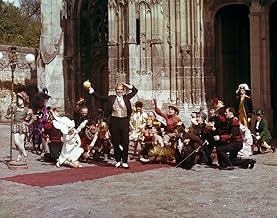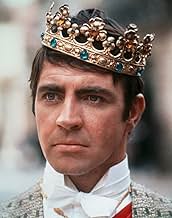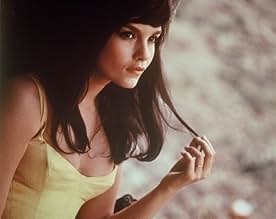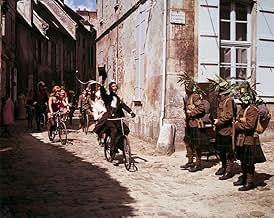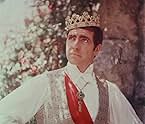CALIFICACIÓN DE IMDb
7.3/10
4.6 k
TU CALIFICACIÓN
Durante la Primera Guerra Mundial, un soldado británico, enviado a una ciudad francesa para buscar la presencia del enemigo, es confundido con un rey por pacientes de un manicomio.Durante la Primera Guerra Mundial, un soldado británico, enviado a una ciudad francesa para buscar la presencia del enemigo, es confundido con un rey por pacientes de un manicomio.Durante la Primera Guerra Mundial, un soldado británico, enviado a una ciudad francesa para buscar la presencia del enemigo, es confundido con un rey por pacientes de un manicomio.
- Dirección
- Guionistas
- Elenco
Pier Paolo Capponi
- Un Officier Anglais
- (as Paolo Capponi)
Georges Adet
- L'aliéné-docteur
- (sin créditos)
Jackie Blanchot
- Le Gabalou
- (sin créditos)
Robert Blome
- Un aliéné
- (sin créditos)
Jean-Marie Bon
- Un aliéné
- (sin créditos)
- Dirección
- Guionistas
- Todo el elenco y el equipo
- Producción, taquilla y más en IMDbPro
Opiniones destacadas
A timeless and exquisite treatment of profound and compelling issues, this 1966 International collaboration, was one of the few films ever to give tasteful testimony to being truly sane, or maybe I should say being truly (in)sane in a cruel and berserk world. If you liked Life Is Beautiful, E.T., Star Wars, The Great Dictator, Gandhi, Henry V, Blazing Saddles, or Rain Man... you will probably love this movie. It remains for me among the top three or four, of all movies I have ever seen.
My mother had seen King of Hearts years ago, when she was in college. When I was about seven or eight (a few years ago, she rented the movie. Most of the movie is in French and it had subtitles, so even though I could just barely understand what was being said, I had a wonderful understanding of what was going on. It's the type of movie where what's on screen is enough to let a person get a gist of the scene. When I first saw the movie, I remembered how lovely the music was, how I grew to love the "crazy" people from the asylum, and how beautiful the movie was. When my mom bought the movie, we watched it constantly. I still watch it at least once a month. It's one of my favorite movies. I really do love the music. For me, it simulates fun insanity. I love every single aspect of King of Hearts. If you ever have a chance to see it, then go! Go see King of Hearts!
De Broca's delightful and surreal anti-war fantasy quickly attained a cult status when it was first released, but in recent years it has dropped more and more out of sight. A shame, because it is a charming film, the whimsical, romantic nature of which is entirely French. Even though the underlying message, that of preferring one kind of insanity to another is a simple, absurdist one, the viewer is still carried along by the Gaullic charm of it all.
As the much-put-upon martial ornithologist, It's not just because Bates is the only English member of the cast that one is aware of some awkwardness in his casting. For English cinema goers in particular, familiar with his career, his usual jocular masculinity is hard to reconcile with an child-like character, swept along by events. Those who remember Bates and Oliver Reed wrestling nude in 'Women in Love' (1962) from the same period, or his cocky Vic in 'A Kind of Loving' (1962), may bulk at Bates portraying such a confused innocent. Having said that, Bates' actual performance is balanced and restrained, all of a piece with the rest of the cast.
'King of Hearts' is primarily an ensemble piece. Many of the film's most delightful moments spring from the fancy-filled and flirtatious lunatics who quickly fill the streets, shops and occupations left by the fleeing villagers, their interaction with each other, and Plumpick. This world of fantasy is curtailed by the village walls, which physically as well as mentally encircle their environment. Outside is reality (no matter how ludicrously it is presented), conflict, death. Inside the walls is harmony of sorts, life celebrated. This distinction between outside and inside is made clear in the film. As soon as Plumpick attempts to ride a horse back into the real world for help, the music and the mass accompaniment of him by the inmates has to end until he is obliged to return.
As the 'King of Hearts' Plumpick is at the center of his motley 'people', as well as of Coquelicot's (Geneviève Bujold) affections. Once he awards himself his name, in a panic and on the run, his 'subjects' call out for him. He is promptly 'crowned' (both by banging his head, inducing his initial confusion, and though acquiring his 'kingship'). He is awarded a bride, and accepted as an unique traveller into the society of the amiably mad. Their acceptance of him anticipates the final scene of the film, when a chastened Plumpick re-admits himself into their company, having rejected the larger insanity of warfare.
It's fitting in a way that the least successful parts of the film lay outside of the village, where comic stereotypes replace whimsy and the comedy is drawn with much broader strokes. In particular Colonel MacBibenbrook (Adolfo Celi, better known as Emil Largo in 'Thunderball') is uncomfortably close to parody, and his part would have been much better cast with an actor like Trevor Howard who could excel with a line in ironic bombast. The Germans fare no better and, although amusing and lightweight in their capers, one misses the delicacy with which the lunatics are portrayed. One suspects that De Broca associates more with the geniality of the insane, as we all do given the options, and this sympathy is reflected on screen
Tellingly, the lunatics are not completely oblivious to the hostile world which surrounds them, although they are content to ignore the immediate threat of destruction and Plumpick's warnings. At the end of the film, once the opposing forces have symbolically destroyed themselves, Marcel says:'I'm tired of this game, let's go back to our rooms'. With deliberate sadness, they divest themselves of their play robes and return to their asylum, a divestment scene at the same time quiet, serious and eminently sane. It is clear that they are mad - but not crazy.
As the much-put-upon martial ornithologist, It's not just because Bates is the only English member of the cast that one is aware of some awkwardness in his casting. For English cinema goers in particular, familiar with his career, his usual jocular masculinity is hard to reconcile with an child-like character, swept along by events. Those who remember Bates and Oliver Reed wrestling nude in 'Women in Love' (1962) from the same period, or his cocky Vic in 'A Kind of Loving' (1962), may bulk at Bates portraying such a confused innocent. Having said that, Bates' actual performance is balanced and restrained, all of a piece with the rest of the cast.
'King of Hearts' is primarily an ensemble piece. Many of the film's most delightful moments spring from the fancy-filled and flirtatious lunatics who quickly fill the streets, shops and occupations left by the fleeing villagers, their interaction with each other, and Plumpick. This world of fantasy is curtailed by the village walls, which physically as well as mentally encircle their environment. Outside is reality (no matter how ludicrously it is presented), conflict, death. Inside the walls is harmony of sorts, life celebrated. This distinction between outside and inside is made clear in the film. As soon as Plumpick attempts to ride a horse back into the real world for help, the music and the mass accompaniment of him by the inmates has to end until he is obliged to return.
As the 'King of Hearts' Plumpick is at the center of his motley 'people', as well as of Coquelicot's (Geneviève Bujold) affections. Once he awards himself his name, in a panic and on the run, his 'subjects' call out for him. He is promptly 'crowned' (both by banging his head, inducing his initial confusion, and though acquiring his 'kingship'). He is awarded a bride, and accepted as an unique traveller into the society of the amiably mad. Their acceptance of him anticipates the final scene of the film, when a chastened Plumpick re-admits himself into their company, having rejected the larger insanity of warfare.
It's fitting in a way that the least successful parts of the film lay outside of the village, where comic stereotypes replace whimsy and the comedy is drawn with much broader strokes. In particular Colonel MacBibenbrook (Adolfo Celi, better known as Emil Largo in 'Thunderball') is uncomfortably close to parody, and his part would have been much better cast with an actor like Trevor Howard who could excel with a line in ironic bombast. The Germans fare no better and, although amusing and lightweight in their capers, one misses the delicacy with which the lunatics are portrayed. One suspects that De Broca associates more with the geniality of the insane, as we all do given the options, and this sympathy is reflected on screen
Tellingly, the lunatics are not completely oblivious to the hostile world which surrounds them, although they are content to ignore the immediate threat of destruction and Plumpick's warnings. At the end of the film, once the opposing forces have symbolically destroyed themselves, Marcel says:'I'm tired of this game, let's go back to our rooms'. With deliberate sadness, they divest themselves of their play robes and return to their asylum, a divestment scene at the same time quiet, serious and eminently sane. It is clear that they are mad - but not crazy.
A charming film, first, for the contained naked truth. Second, for status of reflection in mirror of near reality, in too many senses. Not the last, for acting and the veil of innocence and cold / precise perspective about life, freedom, expectations, fears , joy in pure state. A film deserving to be loved and seen often. As a sort of cure. So, Alan Baits and Genevieve Bujold. And the others. A cold perspective, seeming a kind of verdict, about reality and its large illusions.
It's World War I, and a Scottish Private named Plumpick (Alan Bates) is ordered to infiltrate a French village and stop a bomb that the Germans have planted from going off. Upon arriving, Plumpick discovers the entire village deserted, except for the patients of the local insane asylum, who have been left behind. The patients soon escape the asylum, play dress-up with the various clothes they find lying around the village, and take it over. Not only this, but they crown Plumpick their king! With the German army still in the vicinity nearby, Plumpick must find the bomb, diffuse it, and save his "subjects" from certain death....
An all-time foreign film classic, "Le Roi De Coeur," aka "King Of Hearts," is a marvelous movie, full of sweetness, charm, and both clever comedy & fine drama that also comments very well on the stupidity of war. Alan Bates, who sadly passed away recently, is simply wonderful as Private Plumpick, as is the lovely Genevieve Bujold as the young patient named Poppy that Plumpick falls for, and Adolfo Celi is quite funny as Plumpick's stuffy superior officer. The rest of the film's big ensemble cast, whether playing the asylum patients or various soldiers, are all excellent, too.
The only thing that stops "King Of Hearts" from being perfect is that it *could* very well be argued that the insane asylum patients in this movie aren't...well, *insane* enough. They may speak strangely to one another or to Private Plumpick, but, for the most part, they act & behave quite coherently. But other than that, "King Of Hearts" is a very charming foreign film, and one of the very best films of the late, great Alan Bates. Definitely seek this one out.
An all-time foreign film classic, "Le Roi De Coeur," aka "King Of Hearts," is a marvelous movie, full of sweetness, charm, and both clever comedy & fine drama that also comments very well on the stupidity of war. Alan Bates, who sadly passed away recently, is simply wonderful as Private Plumpick, as is the lovely Genevieve Bujold as the young patient named Poppy that Plumpick falls for, and Adolfo Celi is quite funny as Plumpick's stuffy superior officer. The rest of the film's big ensemble cast, whether playing the asylum patients or various soldiers, are all excellent, too.
The only thing that stops "King Of Hearts" from being perfect is that it *could* very well be argued that the insane asylum patients in this movie aren't...well, *insane* enough. They may speak strangely to one another or to Private Plumpick, but, for the most part, they act & behave quite coherently. But other than that, "King Of Hearts" is a very charming foreign film, and one of the very best films of the late, great Alan Bates. Definitely seek this one out.
¿Sabías que…?
- TriviaWhile the film was a flop with critics and audiences in France, it was an unexpected cult success in the USA, running for years in Boston repertory film houses circa 73-76. Midnight showings around the country made it an early cult film, like El show de terror de Rocky (1975), Cabeza de borrador (1977), El Topo (1970), Más allá del valle de las muñecas (1970), etc...
- ErroresThe stairs/ladder Plumpick uses to climb to the top of the blockhouse appear out of nowhere.
- Citas
[last lines]
Le Duc de Trèfle: The most beautiful journeys are taken through the window.
- Créditos curiososThe credits rise and then fall to coincide with the sound of a large clock.
- ConexionesReferenced in Rescatando al soldado Ryan (1998)
- Bandas sonorasLa Valse Tordue
Written and Performed by Georges Delerue Et Son Orchestre
Selecciones populares
Inicia sesión para calificar y agrega a la lista de videos para obtener recomendaciones personalizadas
- How long is King of Hearts?Con tecnología de Alexa
Detalles
- Fecha de lanzamiento
- Países de origen
- Idiomas
- También se conoce como
- King of Hearts
- Locaciones de filmación
- Senlis, Oise, Francia(insane asylum and town square scenes, Senlis is 55 km north of Paris)
- Productoras
- Ver más créditos de la compañía en IMDbPro
Taquilla
- Total en EE. UU. y Canadá
- USD 17,646
- Fin de semana de estreno en EE. UU. y Canadá
- USD 3,443
- 25 feb 2018
- Total a nivel mundial
- USD 18,130
Contribuir a esta página
Sugiere una edición o agrega el contenido que falta


![Trailer [OV]](https://m.media-amazon.com/images/M/MV5BOTgyNWQ0NTctZWY1Mi00NzY1LTljNWItMWFlNjI2MDMzM2NmXkEyXkFqcGdeQXRyYW5zY29kZS13b3JrZmxvdw@@._V1_QL75_UY281_CR79)

